#ALSO MONOPOLIZED THE COWS.
Explore tagged Tumblr posts
Text
name one difference between etho's nameless wolf in tfcs2 who died in a cave in after repeatedly walking into fire as etho halfheartedly tried to stop it while constantly acknowledging they would not last til the end of the episode. and bdubs last life. you simply cannot
#peter posts#'laughter of sadness' 'i thought it was gonna be different'. the TREE BURNING.#big i've connected the dots (i haven't connected shit) moment#ALSO MONOPOLIZED THE COWS.
283 notes
·
View notes
Text
The health industry’s invisible hand is a fist
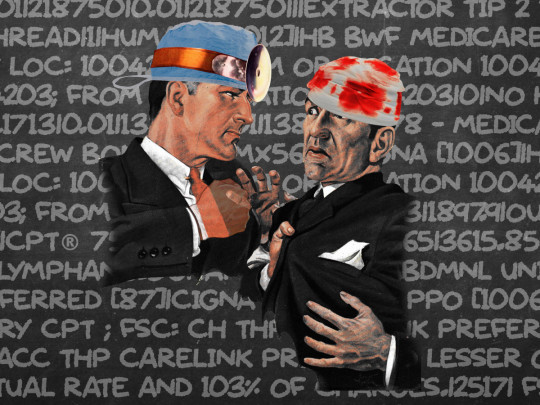
On June 21, I'm doing an ONLINE READING for the LOCUS AWARDS at 16hPT. On June 22, I'll be in OAKLAND, CA for a panel and a keynote at the LOCUS AWARDS.

The US has the rich world's most expensive health care system, and that system delivers the worst health outcomes of any country in the rich world. Also, the US is unique in relying on market forces as the primary regulator of its health care system. All of these facts are related!
Capitalism's most dogmatic zealots have a mystical belief in the power of markets to "efficiently allocate" goods and services. For them, the process by which goods and services are offered and purchased performs a kind of vast, distributed computation that "discovers the price" of everything. Our decisions to accept or refuse prices are the data that feeds this distributed computer, and the signals these decisions send about our desires triggers investment decisions by sellers, which guides the whole system to "equilibrium" in which we are all better off.
There's some truth to this: when demand for something exceeds the supply, prices tend to go up. These higher prices tempt new sellers into the market, until demand is met and prices fall and production is stabilized at the level that meets demand.
But this elegant, self-regulating system rarely survives contact with reality. It's the kind of simplified model that works when we're hypothesizing about perfectly spherical cows of uniform density on a frictionless surface, but ceases to be useful when it encounters a messy world of imperfect rationality, imperfect information, monopolization, regulatory capture, and other unavoidable properties of reality.
For members of the "efficient market" cult, reality's stubborn refusal to behave the way it does in their thought experiments is a personal affront. Panged by cognitive dissonance, the cult members insist that any market failures in the real world are illusions caused by not doing capitalism hard enough. When deregulation and markets fail, the answer is always more deregulation and more markets.
That's the story of the American health industry in a nutshell. Rather than accepting that people won't shop for the best emergency room while unconscious in an ambulance, or that the "clearing price" of "not dying of cancer" is "infinity," the cult insists that America's worst-in-class, most expensive health system just needs more capitalism to turn it into a world leader.
In the 1980s, Reagan's court sorcerers decreed that they could fix health care with something called "Prospective Payment Systems," which would pay hospitals a lump sum for treating conditions, rather than reimbursing them for each procedure, using competition and profit motives to drive "efficiency." The hospital system responded by "upcoding' patients: if you showed up with a broken leg and a history of coronary disease, they would code you as a heart patient and someone who needed a cast. They'd collect both lump sums, slap a cast on you, and wheel you out the door:
https://www.ncbi.nlm.nih.gov/pmc/articles/PMC4195137/
As Robert Kuttner writes for The American Prospect, this kind of abuse was predictable from the outset, especially since Health and Human Services is starved of budget for auditors and can only hand out "slaps on the wrist" when they catch a hospital ripping off the system:
https://prospect.org/economy/2024-06-13-fantasyland-general/
Upcoding isn't limited to Medicare fraud, either. Hospitals and insurers are locked in a death-battle over payments, and hospitals' favorite scam is sending everyone to the ER, even when they don't have emergencies (some hospitals literally lock all the doors except for the ER entrance). That way, a normal, uncomplicated childbirth can be transformed into a "Level 5" emergency treatment (the highest severity of emergency) and generate a surprise bill of over $2,700:
https://pluralistic.net/2021/10/27/crossing-a-line/#zero-fucks-given
The US health industry is bad enough to generate a constant degree of political will for change, but the industry (and its captured politicians and regulators) is also canny enough to dream up an endless procession of useless gimmicks designed to temporarily bleed off the pressure for change. In 2018, HHS passed a rule requiring hospitals to publish their prices.
Hospitals responded to this with a shrewd gambit: they simply ignored the rule. So in 2021, HHS made another rule, creating penalties for ignoring the first rule:
https://www.cms.gov/priorities/key-initiatives/hospital-price-transparency/hospitals
The theory here was that publishing prices would create "market discipline." Again, this isn't wholly nonsensical. To the extent that patients have nonurgent conditions and the free time to shop around, being able to access prices will help them. Indeed, if the prices are in a standards-defined, machine-readable form, patients and their advocates could automatically import them, create price-comparison sites, leaderboards, etc. None of this addresses the core problem that health-care is a) a human right and b) not a discretionary expense, but it could help at the margins.
But there's another wrinkle here. The same people who claim that prices can solve all of our problems also insist that monopolies are impossible. They've presided over a decades-long assault on antitrust law that has seen hospitals, pharma companies, insurers, and a menagerie of obscure middlemen merge into gigantic companies that are too big to fail and too big to jail. When a single hospital system is responsible for the majority of care in a city or even a county, how much punishment can regulators realistically subject it to?
Not much, as it turns out. Kuttner describes how Mass Gen Brigham cornered the market on health-care in Boston, allowing it to flout the rules on pricing. In addition to standard tricks – like charging self-pay patients vastly more than insured payments (because individuals don't have the bargaining power of insurers), Mass Gen Brigham's price data is a sick joke.
See for yourself! The portal will send you giant, unstructured, ZIPped text files filled with cryptic garbage like:
ADJUSTABLE C TAPER NECK PLUS|1|UNITED HEALTHCARE [1016]|HB CH UNITED HMO / PPO / INDEMNITY [34]|UNITED HEALTHCARE HMO [101604]|75|Inv Loc: 1004203; from OR location 1004203|52.02|Inpatient PAF; 69.36% Billed|75|Inv Loc: 1004203; from OR location 1004203|56.87|Outpatient PAF; 75.83% Billed
https://www.massgeneralbrigham.org/en/patient-care/patient-visitor-information/billing/cms-required-hospital-charge-data
These files have tens of thousands of rows. As a patient, you are meant to parse through these in order to decide whether you're getting ripped off on that HIP STEM 16X203MM SIZE 4 FEMORAL PRESS FIT NEUTRAL REVISION TITANIUM you're in the market for (as it happens, I have two of these in my body).
Kuttner describes the surreal lengths he had to go through to prevent his mother from getting ripped off by Mass Gen through an upcoding hustle. By coding her as "admitted for observation," Mass Gen was able to turn her into an outpatient, with a 20% co-pay (this is down to a GW Bush policy that punishes hospitals that charge Medicare for inpatient care when they could be treated as outpatients – hospitals reflexively game the system to make every patient an outpatient, even if they have overnight hospital stays).
Kuttner's an expert on this: he was national policy correspondent for the New England Journal of Medicine and covers the health beat for the Prospect. Even so, it took him ten hours of phone calls to two doctors' offices and Blue Cross to resolve the discrepancy. The average person is not qualified to do this – indeed, the average person won't even know they've been upcoded.
Needless to say that people in other countries – countries where health care is cheaper and the outcomes are better – are baffled by this. Canadians, Britons, Australians, Germans, Finns, etc do not have to price-shop for their care. They don't have to hawkishly monitor their admission paperwork for sneaky upcodes. They don't have to spend ten hours on the phone arguing about esoteric billing practices.
In a rational world, we'd compare the American system to the rest of the world and say, "Well, they've figured it out, we should do what they're doing." But in good old U-S-A! U-S-A! U-S-A!, the answer to this is more prices, more commercialization, more market forces. Just rub some capitalism on it!
That's where companies like Multiplan come in: this is a middleman that serves other middlemen. Multiplan negotiates prices on behalf of insurers, and splits the difference between the list price and the negotiated price with them:
https://www.nytimes.com/2024/04/07/us/health-insurance-medical-bills.html
But – as the Arm and a Leg podcast points out – this provides the perverse incentive for Multiplan to drive list prices up. If the list price quintuples, and then Multiplan drives it back down to, say, double the old price, they collect more money. Meanwhile, your insurer sticks you with the bill, over and above your deductible and co-pay:
https://armandalegshow.com/episode/multiplan/
The Multiplan layer doesn't just allow insurers to rip you off (though boy does it allow insurers to rip you off), it also makes it literally impossible to know what the price is going to be before you get your procedure. As with any proposition bet, the added complexity is there to make it impossible for you to calculate the odds and figure out if you're getting robbed:
https://pluralistic.net/2022/05/04/house-always-wins/#are-you-on-drugs
Multiplan is the purest expression of market dynamics brainworms I've yet encountered: solving the inefficiencies created by the complexity of a system with too many middlemen by adding another middle-man who is even more complex.
No matter what the problem is with America's health industry, the answer is always the same: more markets! Are older voters getting pissed off at politicians for slashing Medicare? No problem: just create Medicare Advantage, where old people can surrender their right to government care and place themselves in the loving hands of a giant corporation that makes more money by denying them care.
The US health industry is a perfect parable about the dangers of trusting shareholder accountable markets to do the work of democratically accountable governments. Shareholders love monopolies, so they drove monopolization throughout the health supply chain. As David Dayen writes in his 2020 book Monopolized the pharma industry monopolized first, and put the screws to hospitals:
https://pluralistic.net/2021/01/29/fractal-bullshit/#dayenu
Hospitals formed regional monopolies to counter the seller power of consolidated Big Pharma. That's Mass Gen's story: tapping the capital markets to buy other hospitals in the region until it became too big to fail and too big to jail (and too big to care). Consolidated hospitals, in turn, put the screws to insurers, so they also consolidated, fighting Big Hospital's pricing power.
Monopoly at any point in a supply chain leads to monopoly throughout the supply chain. But patients can't consolidate (that's what governments are for – representing the diffuse interests of people). Neither can health workers (that's what unions are for). So the system screwed everyone: patients paid more for worse care. Health workers put in longer hours under worse conditions and got paid less.
Kuttner describes how his eye doctor races from patient to patient "as if he was on roller skates." When Kuttner wrote him a letter questioning the quality of care, the eye doctor answered that he understood that he was giving his patients short shrift, but explained that he had to, because his pay was half what he needed, relegating him to a small apartment and an old car. The hospital – which skims the payments he gets for care – sets his caseload, and he can't turn down patients.
The answers to this are obvious: get markets out of health care. Unionize health workers. Give regulators the budgets and power to hold health corporations to account.
But for market cultists, all of that can't work. Instead, we have to create more esoteric middlemen like "pharmacy benefit managers" and Multiplan. We need more prices to shovel into the market computer's data-hopper. If we just capitalism hard enough, surely the system will finally work…someday.

If you'd like an essay-formatted version of this post to read or share, here's a link to it on pluralistic.net, my surveillance-free, ad-free, tracker-free blog:
https://pluralistic.net/2024/06/13/a-punch-in-the-guts/#hayek-pilled
#billing codes#health#corruption#ripoffs#arm and a leg podcast#robert kuttner#prices#austrian economics#Prospective Payment Systems#the invisible hand#shop around#a market for lemons#monopoly#monopolization#upcoding
238 notes
·
View notes
Text
mad city // nct series
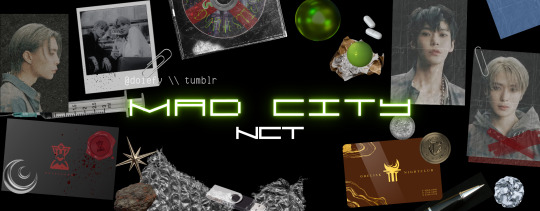
GENRE: sci fi, biopunk, dystopian, thriller PAIRINGS: features both x reader and mxm fics MEMBERS: johnny, doyoung, jaehyun, jungwoo, mark, possibly more to come!
note: if this series looks somewhat familiar, it's because it is! this is a massive rework of my old 'fight or flight' fic for doyoung, which I posted almost two years ago (pls don't read it, like 69% of it isn't canon anymore and I kinda hate it anyways). it's been a real struggle turning it into something I actually want to write for again (which involved changing the original plotline from x reader to dojae, for which I am VERY unapologetic, don't fucking touch me), but after a year or so of on-and-off planning, here it is. I can't guarantee that I’ll get these fics out super speedily, as I also want them to be very visual and will be spending a shit ton of time on graphics; but if you're interested in a tag list for any of these fics, let me know!

WHAT PEOPLE HAVE REFERRED TO AS THE SPLIT: the fracturing of life as it once was, the steady decline of the natural world, all perpetuating political tensions and rampant crime in two rival cities.
To the north lies Iameh, an urban paradise of impressive art and culture, resulting from centuries of mining and exploitation—a pristine exterior built upon the hardship of their southern neighbours. In one of their forgotten limestone quarries lies Siacia: Iameh’s shadow, their forsaken history, but a thriving metropolis nonetheless.
Siacia is all the blinding colours and deafening sound that Iameh is not, boasting citizens with supernatural powers and the most sinister advancements in biotech. From their empty mineshafts and grotesque lifeforms in the quarry lake arises Burner: the Siacians’ fuel, their weaponry, and their only chance against the genetic mutations that plagued them for generations.
But like all things that come out of the ground, Burner is exploited. It is quickly monopolized, used as a drug, turned into a bargaining chip by the Assembly, a loose organization of businessmen and mutants claiming to be Siacia’s ruling government. Those on the streets of the Quarry and its four cardinal faces know very well: what the Assembly demands from them must be given, lest they face their wrath.
So the fissure spreads and opens wider between the two cities, between all people—only a matter of time before one finds themselves dangling off the edge.



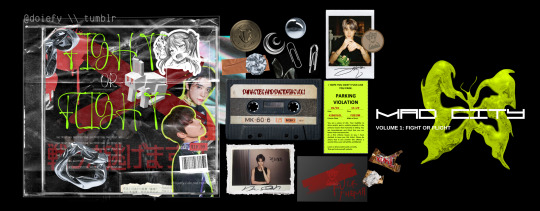
VOLUME 1: FIGHT OR FLIGHT
pairing: doyoung x jaehyun dark comedy with a side of angst, gay shenanigans and way too many dirty jokes.
KIM DOYOUNG HAS SPENT THE LAST THREE YEARS surviving the Quarry streets alone: hunting bounties for the Coffee Cow (a ruthless contract killing agency despite their name), making poor decisions at drinking establishments, and searching for his missing brother.
It’s on one trip to the bar that he runs into Jay: a charming, well-mannered businessman from the East Lanes, with a dimpled smile and particular taste for aged whiskey. One occasion turns into two into multiple—the two seeing each other more frequently with slowly-changing intentions, until the truth comes out. Jay, Jung Jaehyun to his close colleagues, is one of the Assembly’s founding members. Which, unfortunately, means he might have something to do with Doyoung’s missing brother, and makes him one hell of an enticing target.
The resultant cat-and-mouse chase across the city is as frustrating as it is exhilarating. But in a shocking turn of events, it reveals a destructive force beyond the both of them, one that needs their immediate attention and collaboration—regardless of who they are to each other.
anticipated release: summer/fall 2024


VOLUME 2: VIOLET CRAZY
pairing: kim jungwoo x f!reader, johnny seo x reader angst wrapped in drama, tumultuous relationships, a slow but sure descent into madness.
In the aftermath of Johnny Seo’s return, the city of Siacia is not as it once was. Tensions with Iameh are on a steady incline, Assembly politics remain a treacherous game, all while a new strain of Burner spreads through the streets like wildfire. You and Kim Jungwoo are most apathetic to the recent chaos—the two of you like two sides of the same coin, both endlessly spiteful, now embroiled in a feud of your own. For as long as you could remember, your relationship with Jungwoo was one purely of grudge and petty revenge.
But when Johnny begins his reign of terror, perhaps the two of you are in no position to be idle bystanders. Tragedy strikes Jungwoo’s family, and he has a reluctant change of heart. On the other hand, you remain by Johnny’s side, simply watching his flames burn hotter and rise higher. Merely overnight, your long-standing rivalry with Jungwoo has turned into a struggle for the future of the undercity. The inevitable resurfacing of your past, your forgotten history with Jungwoo, and Johnny’s inexplicable grip on you—it won’t be long before it all reaches a boiling point in the crucible.
And certainly not long before you’re forced to face the repercussions.
anticipated release: summer 2025

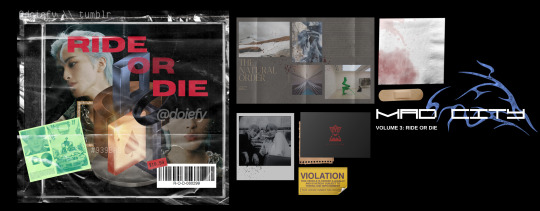
VOLUME 3: RIDE OR DIE
pairing: mark lee x gn!reader from meet-cute to heated romance. ride or die. madly in love to the bittersweet end.
Breakfast tea with magazines and tabloids. Clay-stained aprons and paint-smeared jeans. Afternoon tea with so-and-so, then back to the kiln and canvases. Dinner party with your fellow curators, handling flawless plates and dainty dessert spoons and immaculate champagne glasses—rinse and repeat, again and again, the routine of an Iamehan artist and socialite.
Quickly growing tired of all the glitter and glamour of topside, you take a trip back to your roots: the north faces of Siacia, where you can shed all the silk and cashmere in exchange for the nightlife you grew up with. Dancing wildly to rediscover yourself and inspire your art, that’s when you find your muse: Mark Lee, a VIP at the Obelisk Nightclub, blue-haired and bright-eyed, immersed in the stories you tell him.
You could stay with him forever, seeking thrills and adventure until you reach the ends of the earth. And yet, there is still much more awaiting: the unpleasant and the unideal, and the thwarting of your course by the stars above.
anticipated release: TBD

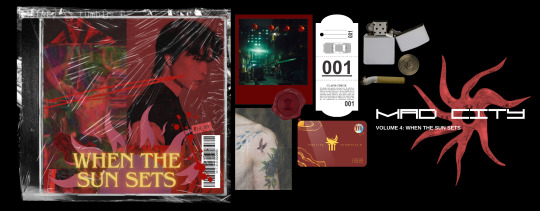
VOLUME 4: WHEN THE SUN SETS
pairing: johnny seo x gn!reader psychological horror turned body horror. toxic romance and a tragic end. (!!) mature content, including manipulative, toxic relationships and darker themes some readers may find disturbing.
Johnny Seo is a reasonable man. A patient man, certainly, never reckless, never cruel. Johnny is loving, the perfect lover. Devoted, and devoted wholeheartedly to you.
In the days and months after the Assembly’s establishment, he keeps you with him at every turn of the road: arm around your waist, head in the crook of your neck, always whispering and promising you better days. A sovereign Siacia is coming, he says. She will be free from the clutches of your northern neighbours, free to do as she pleases. You believe him—until one night, when he comes home bloody and beat-up, furious and unrecognizable.
Johnny Seo is a meticulous man. A calculated mastermind, certainly, never reckless until he’s perfectly sure, never cruel unless he has to be. Johnny is cunning, the perfect trickster. Obsessive, and obsessed with keeping your memory alive. Obsessed with keeping you with him, an eternal part of him.
anticipated release: TBD

#nct fanfic#nct angst#nct fluff#nct smut#nct images#nct timestamps#nct blurbs#nct scenarios#nct#nct 127#nct doyoung#doyoung fanfic#nct jaehyun#jaehyun fanfic#nct johnny#johnny fanfic#nct mark#mark fanfic#nct jungwoo#jungwoo fanfic
39 notes
·
View notes
Text
Bloody nose part 3 // Miguel O' Hara
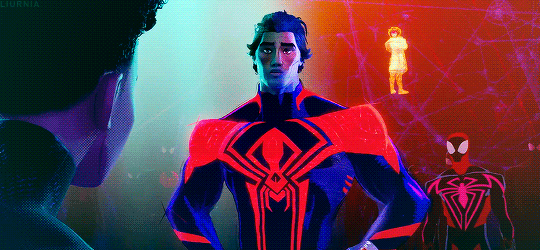
Pairing: Miguel O'Hara x Female Reader
Summary: You integrate the Spider Society, not without a couple of twists and turns.
Warnings: Swearing.
Tags: Comedy, action, BAMF! Reader, Reader has super powers, slow burn.
Words: 2570 words.
A/N: Some Hobie in this chapter! Can you blame me, he's so cool and funny. It's completely platonic in regards to the Reader of course.
Part 1. Part 2.

The interdimensional portal in your living-room and yourself are looking at each other defiantly. At least if that thing had eyes you imagine it would do that.
You don’t like portals. Not that you ever used one before, but the little you know from fiction inspires you absolutely zero confidence. Whether they come from magic or technology, crossing through time or space like so feels unnatural and incredibly dangerous. What if you end up in an endless void? What if one half of you get stuck on the other side? What if you end up a thousand feet up in the air and fall ineluctably to your death? Your powers cannot protect you from this.
Your niece isn’t here to reassure or guide you, since today’s a school day. You could have waited after school but the sooner you cut all her ties to the Spider Club, the better in your opinion.
You’re doing this for Naomi, you remind yourself, and, with a deep inspiration, you go through the pulsating hexagon.
The whole trip is a torture. You force yourself to let go, just let the current, or whatever is the mysterious force moving your body, carry you to your destination. I hate this, I hate this, I HATE THIS, you mumble to yourself.
Eventually the red and orange surrounding you turn to blue, then to a blinding white light, and the mysterious force transporting you suddenly cease to exist so you… drop like a stone. And crash miserably on the platform coming to meet you. Thankfully, there’s not a soul around to witness your pathetic entrance. You quickly get up, unharmed, except for your pride.
The elevator you’re in happens to be in glass and your attention is immediately monopolized by the views offered to you. Green stretches and futuristic white buildings spread as far as the eye can see. You’re definitely not in Kansas – ahrem, not in New York anymore. You’re so subjugated, you almost miss the elevator coming to a stop and the door behind you opening.
The room in front of you is sizeable, even if its deep whiteness and neon lights give it an hospital like aspect, and full of Spidermen. Women. Teenagers? They’re all wearing their suits and you suddenly feel, at the same time, like a sore thumb standing out, and like you just arrived to a fucking comic con. You start walking, torn between trying to pass unnoticed, and hurting your neck trying to take it all in. You never imagined this place would be so big and have so many people. You may be forced to take those guys seriously after all. All the Spiders walking on ceiling will certainly take you some time to get used to it.
You’re distracted by a cow-boy spiderman whose horse is apparently ALSO Spiderman – Spiderhorse? – since it can walk on the ceiling and wear a mask too, starting to wonder in what kind of mess full of weirdos you got yourself in, when the inevitable happen: you bump into someone.
“My bad”, you apologize immediately.
“No worries, mate”, replies a voice with a thick British accent.
You look up – because, once again, this is someone who’s towering over you – and take in the teenager facing you with an easy smile. Your gaze lingers on his numerous piercings then take note of the spikes on the shoulders of his leather jacket. There’s a punk spiderman? You think to yourself, before taking the good resolution to stop wondering what kind of spidermen exist – obviously the list never ends.
Thankfully the kid doesn’t seem to take offense to your staring as he addresses you in a joking manner:
“Forgot your suit at home? Happens to the best of us. Or maybe you’re Spider-Hoodie?”
It’s your day off and your tracksuit, sport shoes and zip-up hoodie could never pass for a superhero costume.
“I… I’m a new recruit”, you answer with less confidence that you would have liked. What if they consider you an intruder? Sound the alarm and send a thousand spidermen after you to throw you in an interdimensional jail?
“You don’t sound so sure about that”, he raises an eyebrow, eyeing your watch. “You know what you’re getting into?”
It’s your turn to raise an eyebrow.
“I’ll manage, kiddo, but thanks for the concern.”
He raises his hands in surrender.
“Just checkin’, that’s all. Name’s Hobie Brown, by the way.”
You give your own name in answer, but as you go to shake his hand, you stop dead in your tracks.
“You… change colours? You change colours. That’s a thing. Ok.”
You stupidly stare at him as he goes from the traditional blue and red of spiderman to just red to pink to settle on black and white. He chuckles at your confusion.
“You’ll get used to it. So, you know where you’re going, Newbie?”
“I’m supposed to meet with Miguel, I guess.”
Hobie doesn’t even try to hide the antipathy that name seems to evoke for him.
“The big boss man, ‘course. You in a hurry? Cause if you’re not, we could take the scenic route.”
You can’t stop the smile that spreads your lips.
“You’re always looking to make new recruits desert and stand up the boss?”
“Always. Antagonizing the authorities is one of my favourite hobby.”
You laugh frankly.
“That’s terrific. I think we’re gonna get along great. Scenic route it is!”
Along Hobie, you pass through the Spider Society’s jails, or at least the room where they stock what they call “Anomalies” before sending them to their original dimension. You have a look at their “Strength and Conditioning Centre”, which is really just a fancy and stupidly complicated way to say “gym”, but you can’t help feeling eager upon seeing their state of the art weight machines. You meet Hobie’s friends, Gwen, a melancholic yet resolute teenage girl, and Pavitr, a psyched-up teenage boy for who becoming spiderman sounds to be the best thing that ever happened to him. His enthusiasm momently makes you feel weird, reminding you of the not so long ago times where you only saw your powers as a curse, but you keep your mouth shut. Your own experiences aren’t universal and you have accepted years ago that your opinion isn’t prevailing. Not to mention that ruining a kid’s fun would be quite shitty of you.
You also don’t say anything about the alarming number of teenagers that appears to compose the ranks of the Spider Society. Naomi is the only kid who’s your responsibility, and therefore the only one you have any rights or authority over. Thinking back about your own youth, which was the period when you got your powers, you know from experience that stopping a 15 years old with superpowers to do whatever they want is, for ordinary humans, close to impossible.
Eventually your new acquaintances guide you to Miguel’s… – you can’t possibly call that an office – crypt? Mancave? At first you don’t understand why they stopped since there is nothing in front of you, but then you hear a sound of machinery running and follow the others’ gazes, somewhere much higher than where you were legitimately looking, and finally see the man. He’s standing on a descending platform equipped of a myriad of orange screens, so many that you can’t imagine how he manages to get his bearings between them all, back turned to you.
This is all good and well, except for the fact that his platform is going down at a painfully slow pace that makes you cringe just watching it happen.
“What’s happening?”, you ask the others. You find it hard to believe that with how advanced the technology here seems to be, there’s no way to make this stupid platform go faster.
“That’s his… thing.”, says Gwen. “Don’t mind him.”
You let escape a nervous laugh, the kind you have when you start feeling yourself go crazy.
“Is this a joke? It has to be a joke. Are you guys hazing me? I’m too old for this bullshit.”
The profound silence and the awkward grimaces that greet your remark makes you realize that, no, this isn’t a joke. You don’t know whether to pinch the bridge of your nose or roll your eyes. You want to tell them that they’re all a bunch of crazy freaks in costume and that you never should have come here. Then you grasp that this problem is actually very easy to solve and you leap on the platform. Like you’re in a fucking Mario game.
“What’s up, Miggy?” you force out, with the most insincere smile you can muster, not bothering to hide your irritation.
“Oh, you’re there. Great. Let’s get this over with”, he says with a deadpan voice and an even more deadpan face. That’s when you realize he didn’t even notice your presence until now, too absorbed in his screens. Add to that the fact that he looks like he just pulled an all-nighter. “And don’t call me that”, he adds afterwards, like an afterthought, frowning.
You restrain yourself from telling him he looks like a zombie, and decides to be proactive. The truth is, you learned teamwork the hard way – in the line of fire –, because it never came to you naturally, and you honestly despise it. Nonetheless you know when to put your feelings aside when the situation calls for it.
“Sure”, you start, slowly, testing the waters. ”How about finding some place with chairs and maybe even a table and some coffee? I was sooo excited to join you guys I didn’t sleep a wink last night.”
That last sentence is an obvious bootlicking lie that Miguel doesn’t buy, and he looks like he’s about to refuse, so you pout at the best of your abilities, trying to make him understand that you’re more stubborn than him, and he relents in a sigh.
“Alright. Follow me. And you three – he looks severely at the teenagers nearby – I’m sure you have better things to do.”
You bid farewell to the spider kids who obey Miguel with more or less reluctance.
“Lyla”, he calls out, “Can you tell Jess and Peter to meet us in the conference room?”
You open your mouth to ask who the hell is Lyla, because to your limited knowledge there is no one of that name in the room with you, and leave it open in incredulity when a light in the shape of a woman appears over Miguel’s shoulder and answers him.
“On it!”
“What the fuck is that?”
Alright, that may have been kind of rude, but you’ve had it with all the weird shit around here. You’ve been holding in your comments pretty good until now.
“Lyla’s my personal assistant.” Even if Miguel deigns to answer you, it sounds more like he did it automatically rather than anything else. He keeps walking without sparing you a glance and you follow.
“I’m an holographic AI software“, adds Lyla, who sounds glad to show off.
“You have holograms? That’s so cool… wait. So you’re from the future or something?”
“In my dimension the year is 2099. I’ll explain in details when we get there.”
And so your little trip continues in silence, one which is neither awkward nor comfortable. You think about how Lyla seemed way more chattier than Miguel, so you try your luck.
“Lyla?” There really is something particular about calling the name of someone – something – who you know isn’t there but who you expect to answer nonetheless.
“Yeah?” she replies, materializing in front of you, laying on her back with her hands crossed behind her neck, like she doesn’t have a care in the world. Which you supposed should be expected from a computer program.
“You don’t answer only to Miguel?”
“I am available to assist all members of the Spider Society in protecting the multiverse, but Miguel’s requests take priority.”
“What can you do exactly?”
“Sooo many things… I transfer calls between Spider Society’s members, I detect and track anomalies all over the multiverse, I check the state of the canon, I predict the appearance of canon events, I help Miguel create gizmos and goobers…”
You understood half of that but assume Miguel will explain soon the jargon. You chat amicably with the AI while being careful to not lose Mr Dark And Brooding because you know you will get lost.
***
“Did you get all that?”
After listening religiously to Spiderman 2099 for close to an hour and being bombarded with information, you need a moment to get your act together. You feel like you accidentally tore open the fourth wall of reality itself when you shouldn’t have and what you saw on the other side changed you forever. Alternatives dimensions are real and infinites. You are currently in another dimension where the year is 2099 and New York is named Nueva York. The possibilities are endless. Somewhere out there, there are worlds where your sister is still alive. Where you died instead of her in the accident. Where you don’t have powers.
Miguel’s question brings you back on earth, however. To yearn for another existence can only leads to death and destruction.
“Yep.”
Bad answer. He puts his hands on his hips and raises a sceptical eyebrow.
“Did you now?” His voice is dripping with sarcasm and you want to punch him again.
“Yeah I got it. The multiverse exists. Don’t stay in another dimension for too long or everyone dies. Do not interfere with fixed events or everyone dies. Do not let people from other dimensions linger in one that’s not theirs or everyone dies. This is pretty basic sci-fi time travel’s rules. I just compacted your lecture in three sentences, you’re welcome.”
“Che maravilla. Then you can be in charge of giving my “lecture” to the new recruits.”
“I’d say I don’t make a good pedagogue but at least I’ve never thrown a desk at a kid.” You retort without missing a beat, crossing your arms, a sneering smile spreading your lips, staring back at Miguel.
You can’t really be mad at him for the sarcasm, it’s your favourite form of humour after all. But if he wants to play, you’ll give as good as you get.
Once again, Peter plays the peacemaker.
“Heyyy Miguel, didn’t you want to ask about her powers?”
The aforenamed sits for the first time since you arrived in the room, in the chair facing you.
“Lyla, can you take notes of this?”
Lyla makes a military salute.
“From what I’ve gathered firsthand – he rubs his jaw where you punched him – you have enhanced strength. Is your skin completely impenetrable? What about the rest of your body?”
“Enhanced speed, enhanced stamina. I’m almost unbreakable. My muscles and my bones included. My eyes are not.”
“Define “almost”. ”
“The most damage I’ve ever sustained was when I took a shotgun to the head and it knocked me out for a couple days. Otherwise I’m usually bulletproof.”
“What about fire? Are you also immune? Electric shocks? Explosives?”
“Yes, yes and yes.”
It’s like having a conversation with your doctor.
Peter lets out an enthusiastic “wow” and Jessica considers you more attentively. As for Miguel, you can’t tell if he’s impressed or satisfied to have a promising recruit. However you’re quickly interrupted in your analysis of his expression as he stands up.
“Get up. Time to show what you’re capable of.”
#miguel o'hara#atsv miguel#miguel o'hara x reader#miguel ohara x reader#miguel o'hara x you#spiderman 2099 x reader#mine#miguel o'hara/reader#atsv fanfiction#atsv fic#miguel o'hara fanfiction#miguel ohara fanfiction#miguel o'hara fic#atsv miguel x reader#miguel o'hara x y/n#miguel ohara x you
76 notes
·
View notes
Text
It's interesting there's a very high possibility that Yussa and Fjord develop a business relationship, seeing as Yussa owns the Open Quay and Fjord owns a shipping business.
Y'see, the shipping bay in the Restless Wharf is run by the Glisteners Guild, a private subsidiary of the Uludan family (as in the family of the Marquis of Nicodranas and one of the Assembly archmages). The Uludan family monopolizes business across most sectors. I imagine Fjord will refuse to be bullied into the guild's demands, and I imagine the guild does not look kindly on those who compete with them.
So, as a result, Fjord would likely have to run business out of the docks at the Quay anyway. I doubt the Guild will allow him to operate freely in the Wharf, and the rent (for, say, a storehouse) is cheaper to begin with at the Quay bc Yussa sets affordable rent to spite the Uludans. And, well, it's possible Yussa may be a little generous to someone who willing to become a thorn in the Uludan family's side.
The guild also prevents supplies from going to the Quay, so it leaves the Quay unable to get necessary repair supplies and other materials. So, it'd be very useful to have a shipping company run by someone very stubborn and not easily cowed working out of the Quay.
Also, I like to imagine that Sending where Jester asks Yussa if he's interested in a shipping contract or knows anyone that is.
Stone's Throw Shipping is eventually very successful! So, it's very likely that Fjord has had to talk to Yussa about business, and considering the state of business in Nicodranas, it's fun to imagine that Yussa actively encouraged that success—especially to spite a mutual rival in the Uludans.
#me voice: Here's how Marquis Fjord of Nicodranas can still win.#Yussa Errenis#Fjord#Fjord Stone#Fjord CR#Critical Role things#CR#Critical Role
374 notes
·
View notes
Text
Fencing became a primary mode of seizure of public land and resources for the benefit of individual ranching enterprises in the West. [...] Estimates are that 100,000 bovine animals roamed Texas by 1830. Three decades later, on the eve of the Civil War, that number had increased to an estimated 3.5–5 million. [...] In the boom years of the 1870s and 1880s, the cattle barons enjoyed “near hegemony” over western public lands by declaring a simple right of sovereignty. [...] Thus, part and parcel of the American colonial project was this type of land acquisition – the process of turning the public domain into private property [...]. [E]ntrepreneurs in the new cow towns such as Abilene, Kansas, sought out Texas livestock trails [...]. The most-well-known of the western cattle trails ran from Texas northward to the state of Kansas [...]. From 1867 until 1871, the 1,000-mile-long Chisholm Trail was the main livestock trail from Texas, a trail that ran from San Antonio [...] through Oklahoma and ended at Abilene. [...] They collectively drove 600,000–700,000 [cows] north from Texas during 1871 alone, all eventually bound for abattoirs in St. Louis and Chicago. [...] [Cattle barons] [...] rounded them up, claimed them, branded them, and enclosed them. [...]
---
Infrastructural and technological developments at towns such as Abilene [...] at the termini of the cattle trails also represent a singularly important carceral phenomenon of the nineteenth-century United States Innovations in transportation, specifically, the “cattle car” (and by 1869, the refrigerated car that hauled dead animal carcasses) [...].
It was primarily British companies that played a major role in developing the transcontinental railroad in the 1870s and 1880s – the foreign “cattle barons” – and who eventually also shipped refrigerated cow carcasses to Britain in ocean steamers. [...] The first twenty-car shipment of cows from Abilene to Chicago was in September of 1867. [...] This north-south cattle complex expanded in the 1870s, as the demand for beef, tallow, and hides greatly expanded amid postwar [conditions].
---
Concomitantly, one of the most significant instruments [...] was the revolutionary invention of wire fencing, which facilitated the enclosure of public pasture land for private use. [...] Netz argues for the critical importance [...] [of] the case of barbed wire [in] the violent enclosure and control of bovine animals during colonization of the American West. Joseph Glidden patented barbed wire in 1874 and opened a small manufacturing plant in DeKalb, Illinois, for its production, with large-scale production and sale eventually located to [...] Massachusetts. More than 350 barbed wire patents were issued between 1875 and 1890, although it was the Glidden patent that came to monopolize the market (and indeed, is the fence still in use today). [...]
One rather infamous early adopter in the Texas Panhandle [...] fenced in over 3 million acres of public range with illegal fences while others followed suit [...]. Also in the Texas Panhandle, [a] Scottish-backed [...] ranch pursued its own 3 million acre fencing project, operating on a grant from the state with an estimated 6,000 miles of fence. [...] Such [...] activities led to what has been called the “Fence Cutting Wars” in the early 1880s [...]. Estimates are that up to 7.3 million acres of public land was fraudulently expropriated by cattle companies in this way in the 1870s and 1880s.
---
All text above by: Karen M. Morin. "Bovine Lives and the Making of a Nineteenth Century American Carceral Archipelago". A chapter in Carceral Logics: Human Incarceration and Animal Captivity edited by Lori Gruen and Justin Marceau. Online publication date April 2022. [Bold emphasis and some paragraph breaks/contractions added by me. Presented here for commentary, teaching, criticism purposes.]
46 notes
·
View notes
Text

I posted 7,588 times in 2022
That's 407 more posts than 2021!
589 posts created (8%)
6,999 posts reblogged (92%)
Blogs I reblogged the most:
@rhymingteelookatme
@animate-mush
@kaiserin-erzsebet
@dancinginredshoes
@cattuladaily
I tagged 7,574 of my posts in 2022
#dracula daily - 2,620 posts
#ace attorney - 741 posts
#art - 666 posts
#fanart - 660 posts
#videos - 453 posts
#animals - 447 posts
#leverage - 349 posts
#jonathan harker - 255 posts
#misc - 236 posts
#pfft - 235 posts
Longest Tag: 139 characters
#like. otherwise why cow tipping. translating it as 'i was a badun' or 'i got up to mischief' or whatever would theoretically work otherwise
My Top Posts in 2022:
#5
Seward: Euthanasia is a comforting word...
Van Helsing: And what is happening on the ship? Open your mouth wider while you answer please.
Seward and Van Helsing: *exchanging "subtle" glances of concern and having private conversations about Mina*
Jonathan: I am going to sharpen this knife now. I am going to very casually and calmly mention that my wife is sleeping very soundly and peacefully. I am being very deliberate in all my actions and keeping very alert at all times.
Seward: Thank goodness Jonathan doesn't know of our suspicions! It would break his nerve, the poor man.
Jonathan: That is so true. :) I am readying myself to kill Dracula only. :)
2,243 notes - Posted October 25, 2022
#4
Quincey Harker must grow up surrounded by so much love... He has a doting weird old grandfather who teaches him incorrect expressions from a dozen different languages. A doting weird uncle who records bedtime stories for him on wax cylinders using his phonograph, and does all the voices. A doting rich uncle who absolutely just buys him expensive toys and pays for trips and doesn't think a thing about it, but also spends lots of time with him, got him a puppy and goes on walks together with him and helped him name it.
And of course, two loving parents. Nerds, both of them, but also far more badass than he knows. Parents who have always been there for him and always will be, who support him and love him unconditionally.
Jonathan and Mina started out as orphans, but their son never will be. He has a large and loving and present family.
(And some who he will never meet, but knows the importance of and loves anyway. Aunt Lucy, the sweetest woman who ever lived and who he loves because she is why his uncles and parents all know one another, whose tomb he visits with his mother every year to lay fresh garlic flowers in front of the door. Uncle Quincey, his namesake who apparently saved his mom's life and had a gun that his father has promised will be his too once he's old enough, one he apparently used to shoot at bats with.)
2,452 notes - Posted November 7, 2022
#3
Lucy: *sleepwalks across town to her favorite graveyard bench*
Dracula, emerging from the grave beneath: I don't recall ordering delivery, but... Don't mind if I do!
2,607 notes - Posted August 11, 2022
#2
Another thing I really like is the steadily increasing erosion of Jonathan's PRIVACY.
When he first arrives at the castle, he talks with Dracula for a long time, but while the nocturnal schedule is weird, the conversation itself takes place in a socially acceptable setting. Plus, monopolizing his time in this way is to be expected in this situation. Dracula soon does come into his room unannounced when he's shaving, which is rude. But it's more on the level of walking into a houseguest's unlocked bedroom without knocking, not barging in on someone in the toilet or anything.
The locked doors restrict Jonathan's movements but aside from those locks he is allowed to walk around with only verbal warnings (which on the face initially sound somewhat reasonable). It's not until he breaks the rules by shoving open the stuck door and falling asleep outside his bedroom that there's any escalation. It's a big one in the moment: the attack of the ladies both reinforces the idea of danger lurking here/punishing him for disobeying, and positions the Count as something of a safety net against even worse dangers. There is also the first big breach of privacy, when Dracula carries the unconscious Jonathan to bed and changes him, then gaslights him about it all the next day.
Other breaches of privacy soon follow. He's told to write the pre-dated/scripted letters. And when he tries to send out an SOS, it's returned and burned in front of him, before he is locked in the room he's in for the rest of that day. When he gets back to his bedroom, he notices the next morning that all his papers, his ID, traveling clothes and bag, have been stolen. (Which is probably what Dracula was doing while Jonathan was locked in the drawing room. Probably why he was so cheerful upon returning.)
Jonathan's range of movement/safety has been reduced from the whole castle, to the halls and some rooms, to just HIS room, to his letters, to nothing at all but the journal he literally has stashed on his person at all times. And even then, the Count has changed his clothes while he was unconscious once before, and is able to climb through the windows/break the door open the way he broke the other one shut if the bedroom door were locked or barred. He's not just in danger — he has no refuge at all. Nowhere and nothing that feels out of the Count's reach, except his journal, which again is only if Dracula doesn't notice it. (Plus the intent was clearly that Jonathan would have nothing at all by this point, and his journal being safe is pure luck, so if it's discovered it would be treated as another betrayal/breaking of the rules.)
Not only can Jonathan not send a letter now even if he found a willing conspirator, but if he were to just flee despite the locks, he'd now have to contend with not only geographic isolation but also a lack of money/identification/travelling wear.
He's been pushed to almost a breaking point of just being completely reckless in search of freedom and safety... except Dracula is still acting like a friend. Jonathan is so entirely within his power, and every other time he's tried to rebel the consequences are swift and limiting. (Whereas, when he listens to the rules, days can go by without escalation.) There's not much further to go from here without openly acknowledging what's happening, and once he does that Dracula has no reason to hold back. It's the rock of "if I do nothing he'll just kill me eventually" and the hard place of "if I disobey again, what will he do this time?"
Again, great psychological horror.
2,954 notes - Posted May 31, 2022
My #1 post of 2022
really, a shame we never got a scene like this:
Nate, planning a con: "Eliot, you're going to take her out."
Eliot: [pauses] "Like..." [somewhat hesitant garroting gesture]
Nate: "Wh- no, like on a date."
4,204 notes - Posted February 9, 2022
Get your Tumblr 2022 Year in Review →
#tumblr2022#year in review#my 2022 tumblr year in review#your tumblr year in review#hey look the privacy post revived somehow#also no surprise that dd took over so much ahaha
2 notes
·
View notes
Text
Many people still don't understand the real reasons why the 2016 Ghostbusters reboot was met with backlash (which, admittedly, some people took way too far, though likely wouldn't have if Sony didn't react the way they did). I want to try to express how I viewed it as a woman that grew up in a culture that was absolutely obsessed with this franchise, who loves it dearly, and who also loves to see badass female characters.
It was not "just because they were women". Ignoring the truly disturbing legal and ethical circus that went on behind the scenes for a moment (for real--Sony is shady as fuck), we know now that Sony actively deleted legitimate criticism left by women on the trailer in order to help sell a narrative of "sexism". I was there watching it unfold, including seeing my own comments magically disappear, and screencapping reactions from others over their deleted comments--some of which had been top comments with hundreds of likes.
This reaction by Sony was a PR disaster. They could not have possibly handled it worse than they did. Instead of accepting or even considering the possibility that they hadn't made a perfect, flawless cash cow, they blamed the film's failure on the very people they originally marketed it to in the first place (the general attitude taken during this debacle was pretty sexist, since they were kind of implying that only men liked Ghostbusters). They pretty much invited a shitstorm onto themselves, and--most unfortunately--onto the actresses. Protip: Don't attack the people you're trying to get to see your movie, because they can sink it just as easily. You're also likely to draw out the worst kind of people who get involved solely for their own sick amusement (such as the racist degenerates that harassed Leslie Jones).
(As a side note, I think the attacks on James Rolfe showed us the fear of an industry that knows it no longer monopolizes the power of influence. "Regular" people can now become wildly popular and influential without any industry assistance, and thus without being controlled by either the almighty dollar, or threatening their future in entertainment. They tried so hard to bury a genuinely chill, down-to-earth guy under a mountain of libel simply because they otherwise had no real power to hurt him)
If the reboot had been new male characters handled the same way, that would have been met with equal disdain (oh wait...that actually happened. Remember the alleged film they were going to make starring Channing Tatum following the 2016 film? That was met with overwhelming negative feedback as well. Funny how the media conveniently ignored that).
No...the 2016 script was written with complete disregard for what the previous films established. FFS, the trailer referred to the original crew as "four scientists". Winston was an ex-marine--not a scientist. That was probably one of the two biggest complaints when the trailer came out. The other was that the ghosts looked like refugees from Disney's Haunted Mansion. Let's compare the 2016 electrocuted ghost to the Scoleri brothers:
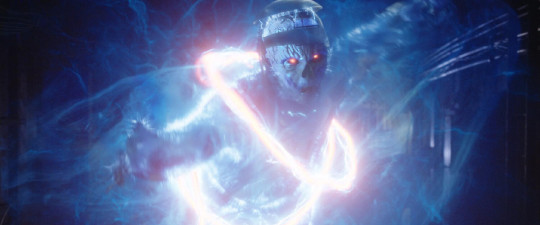

Who's more memorable? (Sorry--couldn't find a gif of the other guy).
And how about the library ghost?


The 2016 ghost is flashier and more polished (and throws up just for the sake of being gross), but she looks like one of those "transforming portraits" you see around Halloween. All of the 2016 ghosts lacked exaggeration, and were too saturated in color, which worked heavily against them. When Ghostbusters II featured more human ghosts, they didn't make them all the same color of neon blue. The costuming is more natural as well (I liked this scene, as it was brought on by a joke, but ended up being a very somber moment).
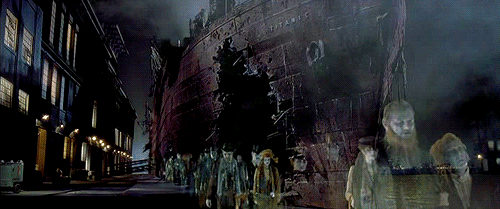
The 2016 ghosts are overall too deliberate. Too much gloss; too much shine. They look more like they're wearing premade costumes from Spirit Halloween than actual period clothing.
What was meant to be Ghostbusters 3 was taken away from Ivan Reitman, and handed off to a complete and utter putz. Paul Feig's first draft of the script (which came out in the Sony leak) was unfocused, and absolutely ridiculous (two words: "alien ghosts"). He also didn't know how to handle darker material. It's like if a writer for Kim Possible tried to do an episode of The Venture Bros.
Could fans have wanted to see women ghostbusters? Absolutely!!! Had the reboot filmmakers done what the IDW comics did and had Janine take up ghostbusting duties, fans would have flocked to see it. Folks not familiar with the animated The Real Ghostbusters series are likely not aware that Janine became a full-fledged ghostbuster in that series. She had her own uniform. She had action figures.
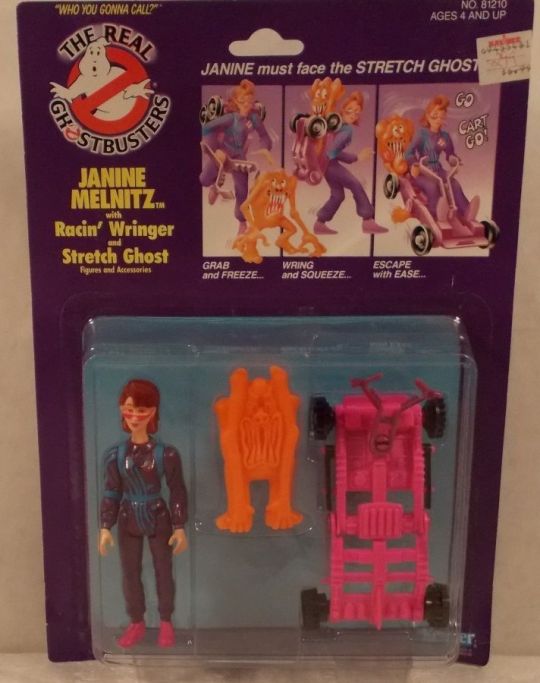
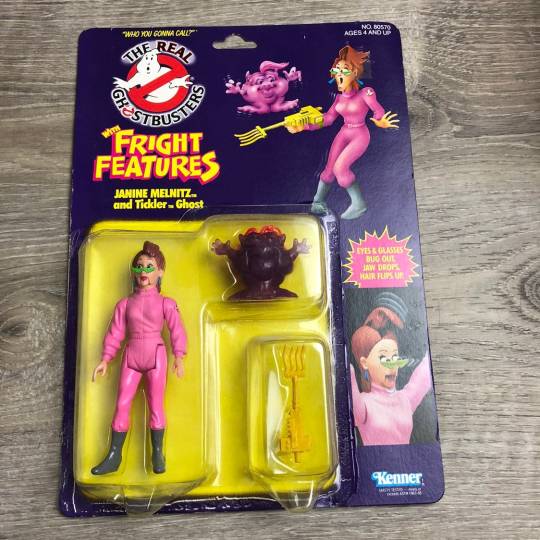
(Every ghostbuster in this line had a scared reaction. Peter's did pretty much the same thing as Janine's)
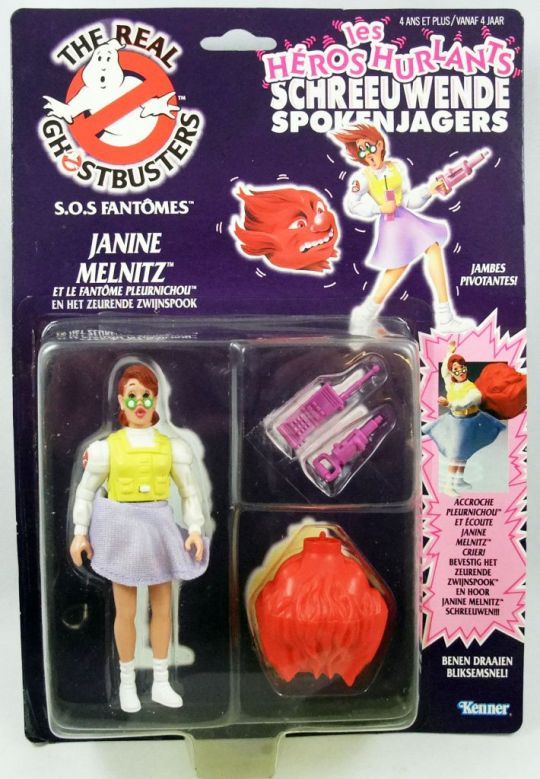
(This skirted figure was from later in the series, after Q5 demanded the writers make Janine more "soft and motherly" and "less abrasive". This greatly saddened little me, as I looked up to season 1 and 2 Janine for being confident, capable, and able to put the fear of god in the boys when she had to)
I'm not posting a photo of the other figure. We don't talk about black-eyed alien Janine here.
The IDW comics also brought in an older Kylie Griffin from the short-lived Extreme Ghostbusters cartoon, as well as added new characters, like Melanie Ortiz.
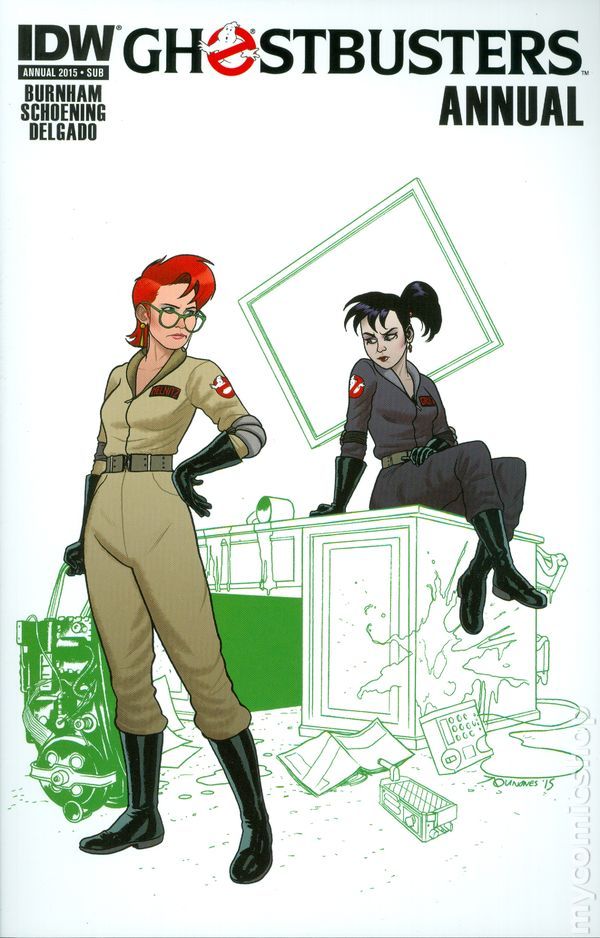
Do you have any idea how happy people would have been to have a movie with Janine and Kylie kicking ghost butt???
For the record, the comics also crossed over with the reboot characters, and those storylines were very enjoyable, because the characters were written like people, and not negative female stereotypes that feminists had been criticizing in films for decades.
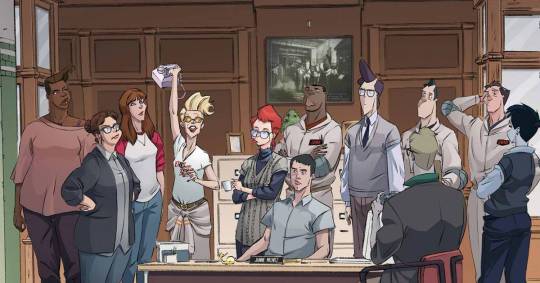
I like Patty. She actually gets to be really cool in the comics.
I'll lastly try to explain one other thing: Imagine if Mr. Rogers had been replaced by Carol Channing without any warning. Even if you love Carol Channing, you'd be upset at the loss of Mr. Rogers, right? Everyone loved Mr. Rogers. Well, people also love Ray Stantz, Egon Spengler, Winston Zeddemore, and Peter Venkman, and the way they formed a perfectly balanced team. These men and the way they interact with each other is the driving force that made Ghostbusters a cultural phenomenon. To not have them present in some way is to lose the very heart and soul of the franchise.
Ghostbusters: Afterlife is effectively passing the torch from the original crew to a new one. People already love and relate to Phoebe, and I could easily see there being more films with her continuing her grandfather's legacy (kinda like how future Witcher games will have Ciri instead of Geralt). Further appearances from the original boys would no longer be necessary, because the torch has been passed. To continue a story requires some level of transference, even if you're presenting new characters. Remember: While people began to appreciate it decades later, audiences initially hated Halloween III: Season of the Witch for having nothing to do with Michael Myers, and that mofo didn't even talk or use a proton gun.
Okay, I'm done now.
EDIT: If you enjoyed the 2016 film, there is nothing wrong with that. Critics, audiences...the only thing that matters is that it makes you happy. I actually liked Day of the Dead 2: Contagium, and that film is widely considered half a step above watching your dog take a shit.
50 notes
·
View notes
Text
disclaimer, I’m a millennial who absolutely grew up on Harry Potter and loved it at the time and initially had a hard time reconciling that supporting it meant supporting Her (and her terfy views) and I needed to drop it.
<rant>
I had a conversation with my roommate the other day about YA novels and media we used to consume when we were in middle/high school, and there were some dope ass series I loved as a kid that weren’t HP that I had totally forgotten about. Redwall, Uglies, Inkheart, and Blue is for Nightmares I hadn’t thought about until that conversation, Series of Unfortunate Events and His Dark Materials I only remembered when Netflix and HBO released shows around them.
And I feel like it’s super fucked that HP had such a monopoly on a lot of millennials’ childhood memories, like when you talk about books you read and movies you watched as a kid your immediate thought is HP*. You kinda forget about all the other stuff that was catered to kids you used to enjoy. Up until pretty recently, the only things I could remember reading/watching as a kid were a) things that catered more towards adults, and b) HP.
(*I’d add Lord of the Rings/Star Wars but HP was definitely more catered towards kids/teens)
And I don’t think I would have remembered things like Uglies if I hadn’t finally cut HP out of my entertainment. Uglies was actually a pretty interesting concept and I can see why I liked reading it as a kid, and I was kind of upset when I realized HP had taken up so much space in my memory that I'd forgotten about it. And yea some of the stuff I read back then was trash because teens have trash opinions sometimes but it was still fun and we ate that shit up. And I feel like I’m kinda starting to see similar happen with the MCU* where a lot of people seem to only watch those and not other things? Like they’re decent plots but they’re not the only things out there.
(*pinch of salt, I don’t really watch MCU movies)
Even before JKR got real public about being a terf I was still kinda starting to cringe at people who were still super into HP because it’s been over a decade and other media has come out. But JKR (and Universal) kept trying to monopolize millennial/YA consumption with her one cash cow after her attempt at writing adult literature kinda busted, and I feel like she really sunk teeth into my generation in a way that encouraged lowkey addiction to her franchise, what with the additional books that turned into lengthy ass movies (Fantastic Beasts), Pottermore, that play she wrote, Twitter engagement, Harry Potter World etc, and while I’m glad she didn’t pull an Anne Rice and ban all fan-art, HP fanart blew up in such a huge way from like Potter Puppet Pals to whatever that musical was that made Darren Criss famous that it’s not surprising to me that it’s the only media I could remember for a while.
There’s a bunch of millennials that refuse to drop it even though she’s a terf and actively using HP fans as "proof of support" for anti-trans legislation in the UK. To my roommate’s point it’s likely because they feel like dropping HP will mean abandoning their childhoods, but the reality is if you were into HP you were probably also into other stuff.
(Also like I feel like if trans kids have had to gamble between abandoning identity/happiness vs potentially abandoning family/safety/security, cis millennials can abandon an aspect of their childhood.)
And yea, it’s important to mourn things that made a huge impact that you don’t have anymore, but people aren’t even willing to mourn JKR’s terf spiral because we KNOW she's using HP support to justify her anti-trans views and people STILL try to divorce HP from JKR. You can't have this one both ways, and until people are willing to accept that, they can’t and won't move on.
</rant>
#anti jkr#anti hp#media consumption#rant#millennials#media monopolization#hp#jkr#ya fiction#anti harry potter
11 notes
·
View notes
Note
Hey! Why don't you like Disney? Is it because the creator was a piece of crap or its for something else?
I mean, sure he was but I dislike Disney because they monopolized much of the entertainment industry in America and other art forms in animation usually die out and fade into obscurity while disney pumps out another liscensed movie with copy pasted characters to further milk the cash cow.
Also, live action mulan propaganda was a thing and that happened
51 notes
·
View notes
Text
See, I was thinking of this all throughout today, and I remembered articles and posts I read about prison labour and how it aids in the economy. I also remember a lot of economics class from last semester, so I did some research, and apparently the forced labour in American prisons produces about $11 billion in goods and services (mainly prison maintenance). It's safe to assume that in America at least, the prison system, while not a major cash cow, still makes up a good chunk of the country's economy.
We know that Light didn't just kill people that were let out of jail/prison, or people who didn't go to prison bc loopholes, red tape, etc like the murderer of Misa's parents (Beyond Birthday is the prime example of this, he was locked up for about a year or so when Light killed him). So that all begs the question, how many people in jail did he kill, and how much would the economy have contracted?? At least in the States? Because during a recession, wages decrease, businesses can't take on as many workers, and therefore there's fewer demands for goods and services so it's safe to assume that a lot more people would have suffered, which, you guessed it! Would have made them commit more poverty related crimes, which makes up the 3-6% of reported crimes since the Kira case began.
This also brings to mind that scene where Near releases all those dollar bills in New York so the SPK could escape safely during the Kira protests. I know that nobody can resist free money being thrown out, (and you are lying to yourself if you say that you wouldn't be out there scooping money off the ground in that situation) but it makes you wonder, could this have been Near's way of monopolizing the "economic recession" brought on by Kira?
Obviously, I didn't expect any of this kind of stuff to be covered in canon, because we aren't here to see the economy suffer, we're here to watch a twink with a god complex and straight A's play God and Sherlock at the same time.
I hate to sound like a boring old geezer who does taxes for fun but does anyone want to talk about how fucked the economy in Death Note must have been during the Kira murders? Because I have been thinking about this longer than I would like to admit.
#death note#I need to put my 89% in economics into anime worldbuilding otherwise what's the point#also this provides some interesting lore for my death note oc sooo...
168 notes
·
View notes
Text
Trustbusting Google
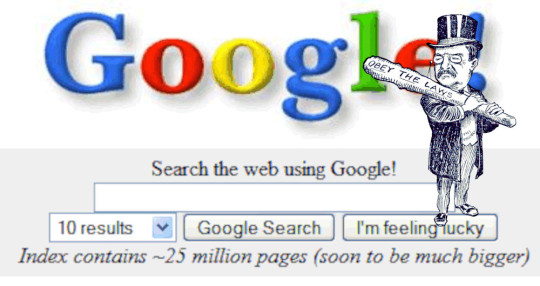
Today, The Daily Beast published "The Justice Department Finally—Finally!—Takes on Google and the Danger of Monopolies," my op-ed on tech antitrust and its connection to the digital rights movement. https://www.thedailybeast.com/the-justice-department-finally-takes-on-google-and-the-danger-of-monopolies I'm in my 19th year as a digital rights activist, and while there's a vogue of accusing the movement of being blind to the possibilities of techo-dystopia, that's a revisionist history. You don't devote your life to the cause if you think it's automatically going to be great. But there was a blind-spot: the assumption that antitrust action would maintain the dynamism, opportunity and variety of the early commercial internet, keeping it from devolving into five giant websites filled with screenshots of text from the other four. https://twitter.com/tveastman/status/1069674780826071040 There was good reason for that assumption, of course. If you got online in the 1980s, then your modem connected to phone lines operated by post-AT&T-breakup "Baby Bells." The reason your PC ran DOS is that IBM was so traumatized by a 12-year antitrust investigation that it allowed Microsoft to make its OS, rather than risking more enforcement through vertical integration. And the PC clones from dozens of new upstarts were only possible because IBM didn't pursue the then-tiny company Phoenix for cloning its ROMs, again, out of fear of a rerun of its antitrust trauma. https://www.eff.org/deeplinks/2019/08/ibm-pc-compatible-how-adversarial-interoperability-saved-pcs-monopolization When Microsoft came to dominate 95% of the desktop, the DoJ stepped in again to punish it, and if they failed in their breakup bid, at least they cowed the Beast of Redmond so that it stopped killing startups the way it had with Netscape, allowing Google to rise. What we didn't understand was that Ronald Reagan had gutshot US antitrust enforcement and these were its last gasps, as it bled out over two decades. We didn't understand how thoroughly Reagan's court sorcerer, Robert Bork, had transformed the consensus on monopolies. We didn't understand that every president that came after Reagan, right up to today, would continue to encourage monopolization under cover of the doctrine of Robert Bork, creating a world where every industry has collapsed into oligarchy.
Five publishers
Four studios
Three labels
Two brewers
One eyewear company
and falling. Which is why the federal Google antitrust action is exciting - not merely because the complaint threads the impossible narrow eye of Robert Bork's needle for anti-monopoly enforcement; but because it made so many people recognize that getting Google for search dominance is like getting Capone on tax-evasion. The pretense that monopolies are good, actually, is wearing so thin that even its beneficiaries are doubting it. One area that interests me with my digital-rights-activist hat on is how monopoly changed the fortunes of tech workers. Back when there was competition in the industry, tech workers had a stake in unfettered tech industry growth. But monopolization created the investors' "kill zone": the areas adjacent to Big Tech's walled gardens that no one will invest in, recognizing that Big Tech can simply obliterate any competitor in these areas. That leaves Big Tech to enjoy double-digit year-on-year growth without having to endure what Peter Thiel calls "inefficient" competition. It also means that tech workers don't realistically dream of doing to Google what Google did to Yahoo. The best they can hope for is to do a fake "startup" that's actually aimed at "acqui-hire" - an acquisition for the sole purpose of hiring a team that has proven it can field a product. The startup's product is flushed, and the VCs get a commission in the form of a buyout. Instead of building an empire or "making a dent in the universe," tech workers are promised a well-funded retirement, mini-kitchen kombucha on tap, and free massages on Wednesdays. The path into the tech industry generally starts with the heady rush of empowerment that comes from writing code and using networks to share it, and to find communities of likeminded people. The rush of self-determination and agency. But monopolists thrive by moving risk off their balance sheets and onto those of their suppliers, users and customers - by confiscating and hoarding agency and self-determination. Techies who fell in love with the experience of technological agency now spend every hour God sends taking it away from others. I think that this - along with other fracture lines - is behind so many of the moral reckonings we're seeing from tech workers. Tech Solidarity, Tech Won't Build It, No Tech For ICE, the googler walkout, etc - techies are confronting their role in technological dystopia, and they are flexing their muscle. It's a gorgeous thing to behold. My latest novel, ATTACK SURFACE, is a Little Brother sequel for those techies - a story of moral reckoning with complicity in technological oppression. It came out a couple weeks ago, and I've heard from a lot of tech workers with whom it resonated. https://craphound.com/category/attacksurface/ So many activists, security researchers, human rights cyberlawyers and ethical hackers tell me that their careers started when they read the first two Little Brother novels. Today, it feels like they're finally getting the reinforcements they need.
27 notes
·
View notes
Text

It wasn’t everyday that the Okumura family went down the mountain. Their home at the top was safe and isolated. Their own little oasis, away from prying eyes. It kept them hidden from those who wished them harm, which according to their parents, were a lot of people. Many wanted them for their powers and abilities. Their lineage being of high interest to those outside of their little mountain top home.
But today was a special day. The autumn weather brought a chill to the air but the path down the mountain was still free of snow. This was their chance to head down to the town that sat at the base of the mountain. Their parents have taken turns about two or three times a month going into the town to shop for supplies. Usually food from the market and other miscellaneous items they may have needed. Sometimes they were allowed to join their parents, but those trips were always quick and kind of boring. Today’s trip was only meant for fun.
All three kids were packed in the back of the car while the parents sat up front. The father was driving while his pregnant wife helped navigate. The kids in the back chatted happily about what to expect from where they were going. All three of them have been on this annual trip before.
The oldest was stuck in the middle, in-between his sister and brother. He wore a bagging blue sweatshirt and pants. His dark hair was messy and falling in his face. He was also the tallest of the three, but only by a couple of inches.
To his right was his younger brother. He wore a plain tee with a long-sleeved, plaid button down shirt over top of it. His snowy white hair was kept neater than his brother’s, his bangs straight and hair cut short. The boy had one of his arms leaning against the car door and his fist propping up his head. He stared out the window, watching the trees fade away as they were replaced with farm land.
On the far left was the youngest and only girl. She monopolized the conversation, but no one seemed to mind. Her hands moved with her as she spoke enthusiastically about their trip. Her long, wavy black hair went all over the place and looked like it could swallow her up. Her oversized glasses kept sliding off her face because of how much she moved in her seat. She was the most dressed up between her siblings, wearing a black and white spiderweb skirt that sparkled in the sunlight and a gray shirt with a purple bat on the front.
“We’re here!” Their mother told them as they pulled into one of the farms. The farm had hay bales and pumpkins decorating it, with a sign that said “Pumpkin Patch” in big orange letters.
The little girl squealed in excitement while the oldest boy clapped. The car followed the signs that pointed them to the open field designated as a parking lot. Once the car came to a stop, a chorus of unbuckling sounds could be heard as the family filed out of the vehicle.
Rin went around and helped his daughter jump out of the car. She was followed by Hikaru, her older brother. Izumo helped Rukio on the other side. Rin has to hold Yuriko’s hand to keep her from running off. She was determined to find the biggest pumpkin.
Hikaru took the lead, taking his family over to the nearest line of pumpkins. He and his sister quickly examined every gourd, checking for height, roundness, and stem quality. Even Rukio seemed excited to pick his own pumpkin, but he kept hold of his mother’s hand as he pulled her with him to look at the selection.
In the moment, they were like any other family picking out their Halloween pumpkins. Hikaru found a standard round pumpkin. Not too big and not too small. He claimed it was just right for carving. Yuriko found a pumpkin as tall as her and was bubbling over with anticipation of carving it and possibly hiding in it. Rukio found a smaller pumpkin, but it was uniquely white like his hair. He liked that the pumpkin was different from all the rest.
Rin helped carry Yuriko’s pumpkin (he was pretty sure it weighed more than her). The boys carried their own pumpkins. Izumo picked a tiny pumpkin to go with their collection. The family paid for their picks then carried their purchases to their car. Rin loaded the pumpkins into the trunk, then escorted his family to the line waiting for the hayride.
When it was their turn to hop into the back of the trailer covered in square hay bales, Rin lifted all three kids onto the trailer. Then using his demonic strength he lifted his pregnant wife up too. Luckily, no one noticed his display of strength. The family sat together on the bales of hay, the kids in-between their parents. The tractor pulled the trailer around the farm, letting the family see more than just the pumpkin crop. When they passed by a field of black and red cows, Yuriko tried calling them. She begged her father to let her go pet them, but Rin said they can’t leave the ride.
When the ride was over, the family finally left the farm and went back home up the mountain.
16 notes
·
View notes
Quote
For more than a century, the social forms that supported classical liberalism have been in decline. The most precise description of the change is proffered by James Burnham and other writers on the “managerial revolution,” which has overthrown the bourgeois order just as the bourgeois revolutions overthrew the ancien régime. But many Americans can trace parallel revolutions in their own family histories. My grandfather, like his father before him, owned and operated a farm. He milked cows, raised hogs, and kept a herd of beef cattle. But by the time I was born, dairy farming had been industrialized. During my boyhood, my grandfather had to give up hog farming, which had been monopolized by massive operations that befouled the air while delivering new efficiencies. After these changes, economic life no longer supported family life in the same way. Consolidation meant that fewer people possessed property that they could pass on to the next generation. Improvements in machinery lessened the (perhaps always questionable) advantage of having many sons to help run a farm. Industrial farming operations required managerial skill at the top and a host of wage earners at the bottom. They squeezed out the owner-proprietor jack of all trades. Those with less rural upbringings can tell a similar story. Today, an upper-middle-class person is far less likely to own his own farm, firm, or factory than to receive a salary. Though he makes more money than his blue-collar counterpart, he is nonetheless a wage earner. He does not control productive capital, though he almost certainly has a 401k (which in turn is managed by other salaried professionals). As Joseph Schumpeter observed, this process is a normal part of the capitalist order: “The perfectly bureaucratized giant industrial unit not only ousts the small or medium-sized firm and ‘expropriates’ its owners, but in the end it also ousts the entrepreneur and expropriates the bourgeoisie as a class.” When this happens, property becomes “dematerialized.” It still exists as a formal legal category, but it has lost much of its substance and meaning. This weakens belief in classical liberal conceits, such as the inviolability of private property: 'The capitalist process, by substituting a mere parcel of shares for the walls of and the machines in a factory, takes the life out of the idea of property. It loosens the grip that once was so strong—the grip in the sense of the legal right and the actual ability to do as one pleases with one’s own; the grip also in the sense that the holder of the title loses the will to fight, economically, physically, politically, for “his” factory and his control over it, to die if necessary on its steps.' No number of op-eds hymning private property can substitute for the feeling that ownership and control of productive property brings. If every college student in America could be induced to attend a campus event at which a conservative activist praises private property, it would not save them from living in a world in which wealth means shares in an index fund rather than owning one’s own shop or farm.
Matthew Schmitz, “The Ghost of Classical Liberalism”
4 notes
·
View notes
Text
Who is 5G millimeterwave for?
I’m not a 5G fear nut. 5G isn’t going to hurt anyone, it’s just radio, please god stop saying that 5G will dissolve your bones and bring dishonour on your cow. It’ll only do that if you stand directly in front of the antenna horn, but that’ll also happen with like, FM radio, and very large foghorns.
With that out of the way, a question I’ve discussed with a few friends over the past couple days is: Who is 5G for?
Specifically millimeter wave here. 5G has two bands that haven’t been used for cell networks before, a ~2-5GHz band and a ~24-70GHz band, I don’t recall the exact ranges but those are about right. 5G also has the low-band, which is the normal 900-2000MHz band.
The 2-5GHz band is pretty sensible. sub 10-GHz RF is pretty good at passing through a wide variety of materials, there’s a reason 5GHz wifi is popular, you don’t need ~that~ many more base stations to get it to everyone in your building, and you can put many more users on your network with the increased bandwidth. 5GHz can still pass through walls, humans and cover reasonable distances even without direct line-of-sight, so I really have nothing in particular against mid-band 5G, assuming you consider bringing ~200Mbps internet to mobile devices is a good call. I have strong opinions about that but that’s not the point of this post. If nothing else it at least increases the total network capacity which is a good thing.
Then there’s high-frequency 5G, the 24-70GHz stuff. In that band you have extremely limited range that requires you to pepper the environment with femtocells, each of which needs to be fiber-linked to a high speed backbone because each one offers gigabit connections. These frequencies are so high they can be blocked by your hand if you hold the device wrong, and they pretty much only propagate in straight lines. Now
a) I don’t think anyone needs gigabit on a mobile terminal, grow up, we’re being serious here.
b) What’s the benefit of high speed, low-latency networking on the go if it only works when you have direct line of sight to your femtocell?
I hear a lot of The Tech People talking about how 5G will enable self-driving cars and remote surgery to which I ask: wait what? You think this signal that could be lost, without warning, if I turn a corner, is suitable for self-driving cars? And remote surgery, which would require a femtocell In The Same Room As The Robots, with a full fibre backhaul? Why not just wire the robots in directly?
For something like remote medicine, it’d make more sense to use a local 24-70GHz networking standard like 802.11aj/ay, it even has a fancy name: WiGig. Intel makes cards that can do this TODAY, they sell them for wireless VR stuff, it’s really cool. 60GHz multi-gigabit video streaming in high resolution and frame-rate within a room.
Like, 24-70GHz radio isn't useless, it’s just terrible for a mobile terminal. You should either use it to resurrect the old PAN idea of networking all the devices in your room together locally at high speed, or use it as we already do, for point-to-point microwave connections that need to be fast between fixed dishes.
Having discussed this with some friends, I think there’s a couple good ideas, ranging from fairly conventional to a little tin-foil-hat-but-not-entirely-unbelievable.
1) The conventional idea is that it’s all buzzwords and marketing. Most companies won’t invest in installing millimeter wave outside of a handful of special locations, they’ll stick to the lower bands and call it 5G, and most people won’t notice, because no-one needs gigabit networking to their phone. Self driving cars will never become real, or at least if they do it won’t be on the back of 5G. Remote surgery will continue to use high speed fibre internet. We probably stop getting faster mobile internet because honestly, no one needs it.
2) A little less believable is that these large companies ARE banking on self-driving cars and massively distributed high bandwidth IoT stuff. They intend to sell their 5G services to dense city sensor networks and Tesla and to embed enough millimeter wave in major cities to enable the usage of these high end technologies. Whether it works inside doesn’t matter, that’s not where the self-driving-cars and network of machine vision surveillance cameras are. The humans will get to use their normal 100 Mbps midband and they won’t notice because as humans their ability to consume media maxes out somewhere around 50 Mbps. This is a big gamble to take, but if it does pay off that’s a lot of bandwidth some IoT companies will want to pay for.
3) The tinfoil-hat idea is that this is the move by the telecom companies to eliminate wi-fi. If they can produce enough femtocells, embed them everywhere, and slowly push out the idea of having a “local network”, they can own the entire network, allocate all the frequencies, and charge you for every byte you send between any two devices. No more home LAN’s, just use our high-speed mobile network! This idea isn’t entirely unbelievable when you look at how hard the mobile networks are pushing to get everyone to just use cellular networking for everything. It would be in their interest to monopolize all networking, at least for the bulk of consumers who don’t really use the features of a LAN anyways and who only use their devices to talk to the internet anyways.
24 notes
·
View notes
Text
Veganism for Conservation

Wikipedia defines veganism as “ the practice of abstaining from the use of animal products, particularly in diet, and an associated philosophy that rejects the commodity status of animals. An individual who follows the diet or philosophy is known as a vegan.”
This is different than vegetarianism, which is a non-meat diet. Vegetarians still use animal products like eggs and dairy, while veganism does not. Some people that practice veganism extend the philosophy to their clothing, not wearing leather, and sometimes even wool.
A lot of us have probably interacted with vegans on the internet in posts such as this:
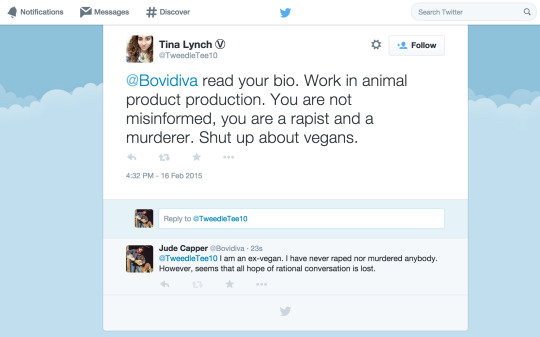
Personally, my interactions with people who practice veganism have been limited to glimpsing internet brawls like this. Because of this, vegans get a bad name. I’m sure Christians can relate: that one wild-eyed priest going on about how homophobia is a sin. He may speak for all Christians, but he cannot represent them.
My point of this is, going into this post, please approach veganism or vegetarianism with an open mind. This post is not hating on vegans, and it is not trying to convert anyone to veganism. By pointing out the strengths and weaknesses of vegan and non-vegan philosophies, I hope to increase understanding.
Where Veganism Succeeds

When it comes to images like this, vegans and vegetarians are sometimes the first to call out animal cruelty. This is not without substance. This PDF article from the University of Kentucky covers some of the issues very well. The main issue is Confined Animal Feeding Operations (CAFO) or “factory farms”. The ultimate goals of the factories are ‘cheap food’. Animals are kept in confined spaces, and given antibiotics and growth hormones to counteract the spread of diseases and parasites (in some cases it doesn’t work). Ironically, some of these drugs are outlaws in the UK, due to the adverse human health effects. Factory farms are a monopolized industry free of heavy regulations of other large-scale operations. Though the FDA and USDA oversee inspections and health regulations, it only helps so much. The Animal Welfare Act of 1966 does not extend to farm animals.
A common response is “Shut down farms!” But it’s not as simple as that. The next article covers the Pro’s and con’s of farming. Farms are run different in different places of the world, and always full of contradictions. Livestock can improve the health of prairie grasslands, but also overgraze them. Animal manure can improve soil health and pollute rivers. While places like America need less meat, poor families in Cambodia may need more protein in their diet. I whole-heartedly support shutting down CAFO’s, but farming in general. Small-scale family farms are a great example of farming with ecosystem and animal health in mind.
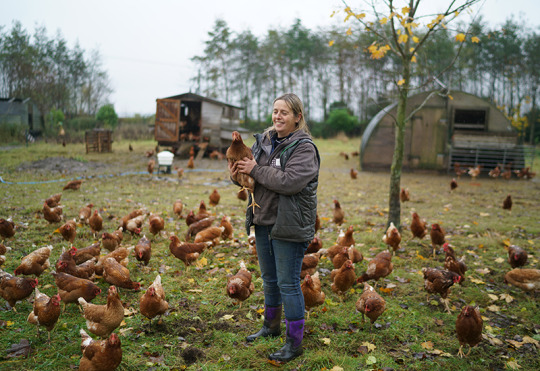
One problem with holding animals indoors - even if you feed them well, make them comfortable, keep them from getting sick - is lack of mental stimulation. No species on Earth processes the world the same way. Cows don’t think they same way humans do, but they are living animals designed to do certain things. A video I watched last year for my animal behavior class (If I could find the video, I’d add it) followed a group of hens brought from a factory farm to a new free-range home. A series of experiment were set up to observe their behavior. When presented with building materials, the hens proceeded to build a nest - even though a nest was already made for them by the caregivers. Animals have inherent behaviors that they will carry out if giving the opportunity. This may not have any impact on the health/quality of the meat or products, but it can give the animals mental exercise and therefor reduce stress.
Recent years have brought in increased in what is dubbed the “locavores.” Locavores is basically a person who eats locally, or within a 100mile radius. They may buy more produce from farmers markets, or get their meat from hunting and fishing locally. (Minnesota has a bag limit of 5 whitetail deer. A successful hunter could stock up food for their family for an entire year without ever buying meat from a grocery store!). Food handling, processing, and transportation takes up a lot of our yearly energy costs, not to mention food shipped from another country is going to be more expensive, and sometimes, less fresh.
The Locavores Movement wasn’t exactly pushed by vegans, but I’m going to include it here because it’s a win for everyone. After WWII, agriculture was becoming more commercialized. Big, industrial farms with lots of land and machinery was out-competing small family farms. Later on, the 60′s and 70′s sparked a ‘back to the land’ movement (a big time for environmental policies). It encouraged relationships between communities and local farmers. Though many small family farms are still financially struggling, the Locavores movement is increasing, as people are becoming more aware of where their food is coming from and their dietary health.

Where Veganism Fall’s Short
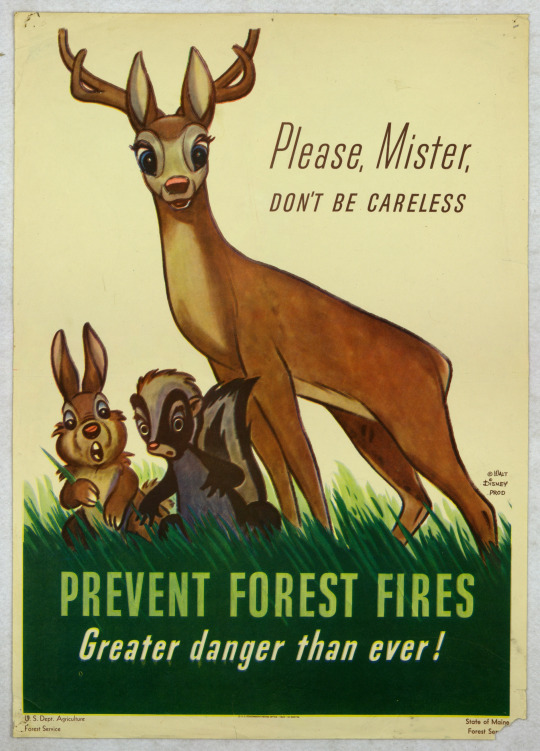
Animal anthropomorphization - defined as ‘ the attribution of human traits, emotions, or intentions to non-human entities’. Giving animals human-like appearances such as walking on two legs, fingers, eyebrows, and having them think and act like humans. This is present in any Disney cartoon regarding animals. Bambi is the most famous, and even created what is known as “Bambi Syndrome”, a belief based on the movie that paints nature as a garden of Eden with no natural predators - which is grossly inaccurate.
Anthropomorphization is not inherently bad, I enjoy watching Disney cartoons and sometimes its fun to imagine animals acting like people. However, there are people who seem to believe than animals really do process the world exactly like people do, and their interactions with the environment and other animals are similar to human - situations. Ex: a bunny rabbit and a deer chase each other around - they must be best friends! People forget that for wild animals, even suburban wild, is a constant struggle for survival. Humans partook in this once to, but now we have grocery stores and houses. We take for granted our ability to get food every day, and go home to a warm night’s rest. Animals don’t have that. Wild animals are focused 24/7 on survival - where to get food, are there any dangers around, ect. Once an animal has gained enough resources to survive day to day, then they can focus on reproduction. After that, in some cases, the focus is on rearing young. And then the cycle is repeated.

The biggest argument comes down to the idea of death. Vegans argue that the act of killing animals is immortal because animals fear death just as humans do. This is true: the fear of death is present in all species. It is an important driver for evolution. Organisms are constantly coming up with new ways to avoid death caused by changes in the environment.
But death is still a really important thing.
Death is something that has to happen, because that is how nutrient cycling works. One organism collects material from the environment until it stops, and those nutrients are redistributed to other organisms. The longer an organism lives, the longer it holds onto those nutrients instead of redistributing them.
The argument that ‘all animals want to live’ is obvious and does not address the fact that death is a natural and important part of our world - just as important as life. Why do humans make such a big fuss about it? Because we have the time and the resources to do so.
Giraffes don’t have time to sit around and contemplate life and death - they’re busy living. They’re busy foraging and migrating and kicking lions in the head. We have to remember the human experience of the world is unique to us - we are the only species that exploited resources so efficiently, we had the time and energy to build Society. Every word and concept in our mind is a imaginary construct, or translated from what we’ve seen in nature. This includes death - a natural process we witness and created an abstract essence around that both increases and diminishes our fears of the inevitable. (Sorry to readers experiencing existential crisis’ - hang in there, take your time. This really is mind-bending stuff when you think about it). Death didn’t have a name until humans created one. We created stories of Grim Reapers and Angels and Demons. We see shadows out of the corner of our eyes and call them ghosts.
But, do we have a right to cause the death of other organisms? Well, in nature, what is a ‘right’? Does the gazelle or the leopard have a greater right to live? My arguments may see really heartless and objective, but I am a biology student, so I have to look at this from an ecological perspective. Why do we look at the animal world through a tight lens of human understanding when we now have to tools to see more? How can we assign human concepts to a world that exists beyond our understanding?

One of emotions we have created do to the development of society is ‘guilt’. Its possible this emotion exists in other animals too, such as a mother who couldn’t protect their young. Guilt has evolutionary advantages of strengthening social bonds, and inciting a change of behavior. But humans are unique in that we extend this guilt beyond our immediate families to multiple other species. Pet owners may experience this when they accidentally step on their pet’s paw.
This philosophy of including other species in our perception of the world is amazing, and very important. Aldo Leopold, a professor of ecology at the University of Wisconsin, wrote in A Sand County Almanac that extending human ethics to the land and its animals was essential for conservation. We need more people involved in biology and environmentalism, but we need them to have a proper understanding of life and death processes of other animals.
Wild animals deal with death much more often than humans do, and not in the same way. An article from Stat News claims half of Americans now die at home in hospice care. I can’t hypothesize numbers, but its same to say that a lot of people, especially in rich countries, get a ‘gentle’ death - in bed, surrounded by family members, eased with pain medications. Animals don’t get that. The quickest, non - human way for animals to die is by being kill by something else. Lions tend to bite the jugular of prey to asphyxiate it. The animal is dead by the time the lions start eating it, but it did not die quickly and peacefully. It’s last moments were being chased by lions, having lions dig their claws and teeth into its body to knock it down. It will take at least a full minute or two to suffocate the animal before it dies. Imagine the last thing you see is a lion biting into your neck - that’s terrifying!
Some deaths are quicker - think of birds picking up ants or insects, quickly crushing them in their beats or swallowing them whole. The thing is, as mammals, we can’t really relate to insects on an emotional level, so that example doesn’t get us far...
Non-predatory causes of death are disease, parasites, starvation, injuries, and old age. Older animals are at risk for all of these combined. A wolf with a broken leg may be fed by the pack for a while, but eventually have to be left behind and starve to death. There are no gentle deaths in the animal kingdom.
Ironically, the fastest and least painful death animal can experience from humans are euthanasia, and a gunshot (as long as the shot is lethal). Euthanasia is common for pets and livestock by first putting them to sleep, and then injecting them with a lethal drug they cannot feel. Its the closest thing to a human dying in a hospital bed.
Gunshots have the potential to be the least painful and the most painful - depending on the skill of the hunter. A ethical shot to the heart or brain means that the animal will be dead before it even feels the bullet enter its body. That sounds a lot nicer than being chased or ripped apart by wolves, or stumbling around, infected by CWD.

Shortcomings of Non-Vegan Philosophies
Hunters and anglers don’t have all fail-proof ideas either. When it comes to conservation, America tends to prioritize animals useful for human consumption - as in, harvesting or observing. “Game” animals, like deer, elk, grouse, and waterfowl, have most of the public’s attention and protection. “Non” game animals like reptiles, amphibians, and invertebrates, are overlooked and at greatest risk for extinction due to lack of funding.
Americans in general, eat too much meat. A quick Google search pulled up multiple articles that said the same thing. These articles are not pushing vegan/vegetarian philosophies, they are approaching the problem from a healthy diet standard. This article from Popular Science covers the American heritage around meat and animals that dates back to colonial times. In medieval Europe, many of the large game animals like stag and bison were gone due to overhunting, and the remaining wild lands were reversed for nobility sport hunting. Important predators like wolves and bear were also removed due to fears and superstition, so, the ecosystems of Europe were...a mess. When settlers came to America, they discovered a land of bounty, and developed a ‘take whatever you want’ philosophy that led to the extinction of the passenger pigeon, and near extinction of the bison and turkey. We eventually realized our mistake and worked up some protection, but still have a ways to go.

Is Veganism helping conservation?
Yes and no. It has it strong and weak points. The strongest, like I said, being pointing out the flaws of factory farms. However, the belief that replacing animal products with plant/synthetic materials will help the planet is troublesome.

The picture is one that comes up when Googling ‘soil degradation’. The land is so dry, it is cracked. The vegetation looks dead and dying, and the soil color itself is a light sandy brown - lacking the deeper shades that indicate the presence of organic material, essential for soil organisms and plant growth. Soil degradation is a problem all around the world, appearing in various forms. It’s leading cause is poor management of agricultural fields. A vegan lifestyle means greater dependence on these farms, but there is never any mention of this problem.
Vegan or not, as an American, I believe it is in our best interest to eat less meat - not totally get rid of it, but have more balanced diets. Soil degradation is a problem for everyone. Luckily, soil scientists are at work discovering new ways to put nutrients back into the soil and lock them in, increasing the health of the soil ecosystem. The plants and animals that depend on it (including us) will be healthier, and some of these techniques can even take greenhouse gasses out of the atmosphere. The Soil Conference at Gustavo's Adolphus College brought in some of these speakers. Video are available on YouTube, and posted to my blog.

A trademark of veganism is refusing authentic leather. It is replaced by synthetic and plant based materials called ‘pleather’, ‘faux leather’ and ‘vegan leather’.
Some sites say these terms are interchangeable, but some say they’re each a little different. Leafy Souls defines ‘pleather’ as leather made from plastic. This is a big problem, because plastic materials, when washed, release micro plastics into waterways. The major problem is these plastics aren’t as easily identifiable are water bottles washed ashore on the beach. Not a lot is yet known about these pollutants, but we have found them everywhere - including inside our bodies.
Luckily, not all vegan leather products are made of plastics. Alternatives have been made from plants, leaves, cork, and even stone!
The big argument against leather and fur products is - it is cruel to kill animals just for there skins. And I actually agree with this. I was never one to buy into the fashion industry, and personally, I think it’s a little outdated, and pointless.
The process of factory made leather from cowhide is a bit disturbing. The manufacturing of leather is contributing so some major environmental issues like the release of greenhouse gasses and water pollution. Some questionable chemicals are also used to treat the leather.
The good news is livestock are not being killed solely for their skin. The cattle sent to slaughter are the same cattle that we get most commercial leather from. Of course, this doesn’t really comfort anyone heartbroken over the commercialized treatment of animals.
Leather manufacturing is also being linked to child labor and poor warehouse conditions. It’s a common American business practice to send labor production oversees to places labor is cheaper - cheaper because workers are paid less for longer hours in poor conditions. The leather industry is not alone in doing this. How we change this? Boy-coting certain products is one way, but some of these companies have monopolies on products. A book by a Michigan State University professor discusses the growing monopolization of food products.
How do we solve problems like this? I don’t know, but something this complex needs a just - as complex solution that may take years to undo.

Fur
Minnesota got its early start as a center for fur-trading between Canadian pioneers and native tribes. Unfortunely, the luxury that was fur turned the market extremely competitive. Since nature is not built for capitalism and competitive markets and commercialism, the fur bearer populations of the state took a dive. (Luckily, all have now recovered).
Fur markets were as bad as market hunting in terms of conservation, but unlike the latter, fur trapping is as persistent as ever today. Thanks to protections and regulations, trapping is able to persist at nearly the same capacity as it was in the 1800′s without threatening a population. (Also, there are significantly less people partaking in trapping).
Personally, I do not care for killing animals solely for the fur or leather. I would prefer to trap animals that also provide food - like rabbits. My believes are that if you kill an animal, you use as much as you can from it - meat, skin, and maybe even some of the bones. Its a way to pay respect by making sure the animal didn’t die for no reason.
Like leather, fur has synthetic replacements. However, I could not find as much environmental information. The main material for faux fur is acrylics, which are basically plastics that do not degrade when released into the environment. It is another source of micro plastics.
Manufactured fur, like real leather, is treated with chemicals like formaldehyde to keep from degrading. Naturally, after discovering this, I Googled health affects of wearing real fur. Problem 1: I couldn’t find a trustworthy website. The websites that came up were strongly anti-fur. I wanted to find information from a neutral website, like a college university article. Problem 2: I could not find anything. I expected to find articles about odd rashes or allergic reactions, but there was non. Instead, I re-discovered an article I used in a previous post about vaccines. Vaccines actually use doses of formaldehyde in them. It’s a scary substance, because we automatically think about it in the process of embalming bodies, but the truth is, it has many practical uses that are safe to human health. Any substance can be harmful or helpful, it all depends on the dosage and chemical makeup. I was reminded that formaldehyde isn’t as scary as everyone makes it out to be. It is actually naturally produced in our bodies, and it probably doesn’t have any adverse effects to being added on our clothes.
Another problem arises when questioning the affects of formaldehyde in the environment. When we wash our clothes, dirt and chemicals end up in our water systems, including micro plastics and formaldehyde. The usual dosages of the chemical is to small to cause us individuals adverse health affects, but the story can change when dumped in large qualities. Our tendency to dump large amounts of waste into confined areas is not natural - animals tend to discharge (biodegradable) waste evenly across a habitat, or at least in quantities than can be broken down. The way humans discard waste in large quantities means that basically anything - including caffeine from our coffee consumption - can have adverse environmental effects. So, the problem of releasing formaldehyde is not on the chemical itself, but more on our system of waste treatment and pollution in general.
Conclusion

I am overwhelmingly tired of the vegan vs non-vegan argument. The more I see people pointing their fingers at each other, the less I want to partake in either one of their ideologies. Great minds think alike but fools seldom differ.
I believe it all comes down to balance. No matter how we exploit resources, there is going to be a downside. Vegan or non-vegan, there is an up and down to every choice. We have to work together and find a middle ground.
If we completely stopped using animals today, there would be changes. CO2 emissions would drop a little, but they may change sources. The same amount of people would need the same amount of food, and 1/3 of that food would come from a different source. There may be more habitat loss from increases agriculture farms, and come communities may became protein-deficient.
If the opposite were to happen, and we increases animal products, there would also be adverse effects. To feed those animals would also require more agricultural land. Factory emissions could rise, along with health effects of too much red meat, like increased cholesterol.
The fact of the matter is, we all kill animals, directly and indirectly, simply by taking up space. The things that make you you - the proteins and carbons and lipids and nutrients - came from another organism. The fact that you have them now means something else is denied them. The cars we drive, the fields we plow, the pollutants we throw out, those are all killing animals as I type this. It sucks. I absolutely hate it. It has happened for the past millions of years, but right now, we are doing it at a faster rate than anything before us.
I cannot fully support veganism in regards to animal ethics, due to the tendency of anthropomorphization and biological misinformation. But I due support the legitimate environmental concerns, and I think a lot more people need to understand them as well.
1 note
·
View note